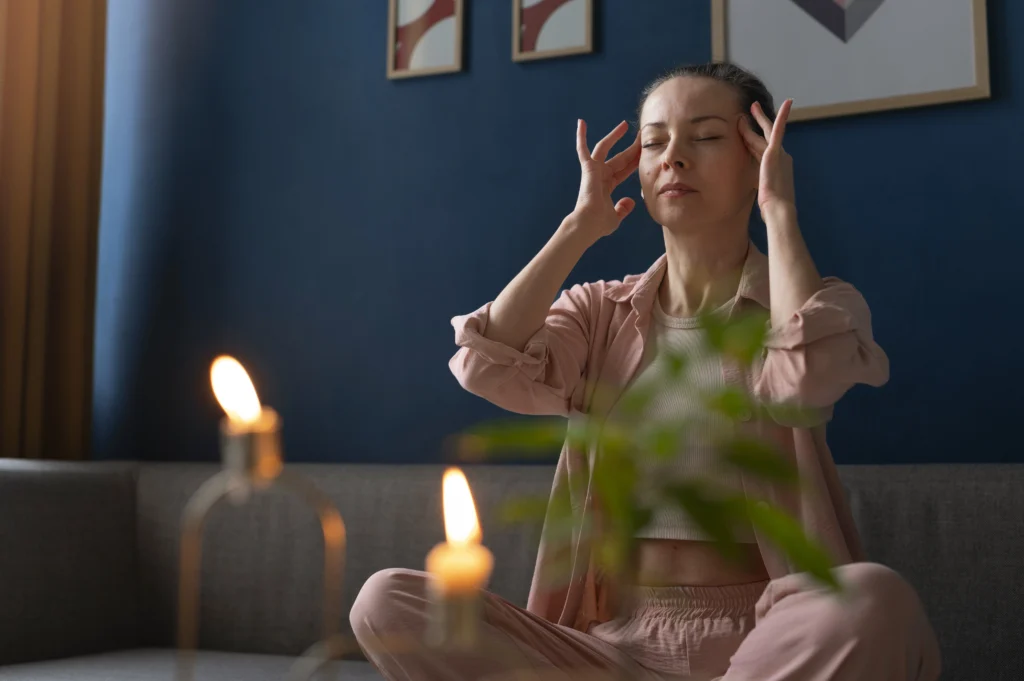Table of Contents
May is Mental Health Awareness Month. This article will share some ways on how to take time out for self-care and give yourself an opportunity to recharge. In today’s fast world, one forgets their self-care. The most crucial thing for your well-being is time for yourself.
Self-care isn’t selfish. It’s about being ready to help others and yourself. It’s an investment in your life.
Key Takeaways
- Mental Health Awareness Month reminds us to take good care of oneself
- Daily physical activities, proper nutrition, and rest constitute mental health
- Meditation can be helpful in the area of relaxation for sending one’s body signals to either calm down or to regain self-control.
- Setting goals, learning to say “no”, and gratitude are among some areas of self-care
- Developing a social support system and reframing negative thoughts are ways to keep away mental disorders.

What Is Self-Care and Why Is It Important?
It involves engaging in activities that make one feel good physically, mentally, and emotionally. Self-care significantly encompasses mental health awareness, emotional wellbeing, and stress management. They highly enrich the quality of our lives.
Understanding the Importance of Self-Care
Self-care is not a luxury; it is a need. Ignoring our needs leads to stress, which truly has very dire consequences on our health and psychological state. COVID-19 has once again proved how very important self-care is, with depression rates having tripled.
A survey was conducted showing many advantages of self-care. People are more confident, productive, and happy. Gym workouts improve our immune system, and we need 7 to 8 hours of sleep every night. Self-care does not mean selfishness; it is the care of ourselves.
The Consequences of Self-Care Negligence
Lack of concern for self-care causes stress in people and affects their health and minds. Anxiety, depression, and stress can be dealt with if one indulges in self-care. It enhances concentration, reduces anger, and increases happiness.
Regular self-care reduces the chances of contraction of heart disease and cancer. It prevents burnout, which is a state of total exhaustion brought about by stress.
Self-care enhances our health and levels of energy and strengthens our immune system. It reduces the levels of stress and symptoms of depression, apart from enhancing our productivity and relationships and preventing burnout.
“Two-thirds of Americans believe self-care activities provide stress relief.”
Self-care is personal and can fit into eight wellness areas, as defined by SAMHSA.
| Self-Care Benefits | % of Americans |
|---|---|
| Boosting of self-confidence | 64% |
| Increasing productivity | 67% |
| Happiness | 71% |
Self-care has been demonstrated as lessening the symptoms of anxiety and depression. It even decreases the chances of heart disease and cancer. It gives us the ability to get through life, build good relationships, and recover from setbacks.
- Rates of depression have tripled during the COVID-19 pandemic.
- Regular exercise has been proven to strengthen the immune system.
- Adults typically require seven to eight hours of sleep per night.
- Two-thirds of Americans report stress relief through activities done for self-care.
Practical Ways to Put Self-Care into Action
Physical Self-Care: Exercise, Nutrition, and Sleep
Self-care basically denotes the maintenance of body and mind integrity. Good nutrition, exercise, and adequate rest will contribute to a life of optimal health conditions and emotional stability.
A thirty-minute daily walk greatly enhances mood and health. On the other hand, physical activity has been able to reduce symptoms of anxiety and depression by up to 40%. In addition, proper nutrition will not only take away energy-sucking foods but also provide better mental clarity. Indeed, the Mediterranean diet can cut depression risks by as many as 35%.
Getting enough sleep is equally important for your well-being. Sleeping for at least 8 hours every night will help reduce stress and improve your mental health. Paying attention to sleep will enhance physical and mental health and emotional resilience.
| Self-Care Practices | Results in |
|---|---|
| Regular Exercise | Up to 40% reduction in anxiety and depression symptoms |
| Wholesome Nutrition | 35% reduced risk of depression with the Mediterranean diet |
| Prioritizing Sleep | Lower level of stress and improved mental well-being |
“Take care of your body. It’s the only place you have to live.” -Jim Rohn
Adding these physical self-care habits into your daily life will make for a more healthy, resilient life.
Mental Health Awareness: Breaking the Stigma
It means being aware of mental health, which is really important in today’s running world. It will help us become more empathetic and supportive towards society. Talking about one’s own mental health openly would reduce stigma and encourage people seeking help.
Recent data shows that youth mental health has surged upwards from 2010 to 2020. This situation compelled experts to declare a state of emergency concerning mental health. Besides, in 2023, Mental Health America reported that 21% of adults suffered from mental illness. This shows how big the problem is.
Younger people are much more open to talking about their mental health. This is a good omen: we do something right in our fight against stigma. Surely a reflection of how important it is that we keep working on making mental health issues less stigmatized.
The leading organizations for mental health include NAMI, MHA, and The Trevor Project. They advocate for policy improvement and resource support and give people platforms to tell their stories. Such organizations are important in fostering a society more supportive of the needs of mental health.
With increased awareness of mental health and the fight against stigma, we will be able to build a society in which seeking help is normalized. It is through this means that all of us will be in a position to learn the value of emotional wellbeing.
Let me reiterate, taking care of your mental health is not selfish; it’s a vital part of taking care of yourself. As we open our arms to mental health awareness and challenge stigma, it changes the world to a kinder, more supportive place for everybody.
Mindfulness and Relaxation Techniques
In today’s fast world, stress has become common. However, the incorporation of mindfulness and relaxation into your daily schedule can make all the difference for good8.
Meditation and Breathing Exercises
Meditation has been proven to help with stress and anxiety, to say the least, through numerous studies. Mindfulness improves attention and sleep while helping deal with diabetes. One must start off by practicing daily mindfulness for six months in order to experience the benefits.
To meditate, find a spot that is quiet and away from distractions. Examples of mindfulness exercises involve focusing on senses and breathing. The goal is to let go of resistance to thoughts and feelings.
Journaling and Yoga
Journaling and yoga help with stress and emotional health. They relax the mind and bring positiveness. Heart rate and blood pressure go down when one relaxes.
Digestive activities and regulation of blood sugar levels also improve. This relief in muscle tension may be due to certain techniques, including yoga and meditation.
Try deep breathing and massage to get benefits. These skills get better with practice. If one doesn’t work, try another or see a doctor.

“Mindfulness is a way of being, not just a technique. It’s about being present, in the moment, and accepting life as it unfolds.”
Time Management and Goal Setting
In today’s fast world, people are productive and mentally healthy because of effective time management and setting of goals. Therein, you have to prioritize what is truly important; then you set realistic goals towards it, finding direction and a sense of purpose. This enhances one’s well-being a great deal.
Clearly stated mental health objectives provide guidelines for improvement and development. These serve to make one feel accomplished and empowered, therefore increasing one’s confidence and motivation toward the job. Success in achieving them will prove that one is on the right path, as it develops a sense of positiveness, which in turn leads to introspection.
To be successful with your goals in terms of mental health, these should be Specific, Measurable, Achievable, Relevant, and Time-bound (SMART). Tools such as journaling or using a digital app may help keep track of success. Sharing with a mental health professional the journey may provide helpful support and advice when obstacles are encountered.
| Key Findings from the Research | Percentage |
|---|---|
| Agree: Setting Smarter Goals Helps me make better Decisions for My Professionally Satisfying Career | 92% |
| Those that believe that setting personal development goals has a positive influence on daily choices and attitude | 78% |
| How many think attaining goals of any size really helps to encourage self-esteem and confidence? | 85% |
| Individuals who find that setting and achieving fitness goals plays a pivotal role in boosting their self-perception and physical capabilities | 70% |
| How many have experienced the setting and achieving of fitness goals as something that acts as a strong building block for self-esteem and physical prowess? | 82% |
This helps in the cultivation of an optimistic mindset through focusing on what one has actually done. This system keeps you organized and helps your mind stay healthy, too.
“The key is not to prioritize what’s on your schedule but to schedule your priorities.” Stephen Covey”
Time management and goal setting, therefore, serve as privileged ways of dealing with everyday life while keeping one’s mental health in order. You will be able to be proactive regarding increasing productivity and self-awareness and to better your well-being by applying these strategies.
The Power of Gratitude and Positivity
A positive approach to life and gratitude does wonders for people’s mental health. Every day, take a few minutes to reflect on the things you are grateful for. It can be small or large. This may make people much happier and more satisfied with life.
These help to fight negative thinking, which is being pessimistic and always looking at the negative side or worst aspect of things. Negative thoughts have been related to anxiety and depression. Indeed, gratitude allows you to realize good feelings and become more positive, which will increase your general mood.
Being grateful does more than good; it can make you 10% happier on the spot. It can also cut feelings of sadness by 35% through regular practice. Besides, it can reduce a feeling of stress and anxiety for as long as six months.
Lastly, appreciation and positivity protect us from psychological illnesses like depression and anxiety. They allow us to be steadfast and positive against life’s storms.
“Gratitude unlocks the fullness of life. It turns what we have into enough, and more. It turns denial into acceptance, chaos to order, confusion to clarity.” – Melody Beattie
Building a Support System
One of the factors that will enable your mental health to work well is maintaining good social relations. For instance, in the United States, one out of every six adults develops mental problems. Good social connections will make you feel good and let your life challenges become easier to handle and live longer.
This will lessen depression and anxiety and will minimize your stress. You can be helped in improving your health and reducing your stress if the people surrounding you will support you.
How to Stay Connected to Loved Ones
Try to speak with friends or family that are going to help emotionally and practically. Social support is necessary to avoid feelings of isolation, which may be worsening the mental health problem. Knowing that there were calls coming in unsolicited from supportive persons made a great deal of difference during difficult times.
A support system is also one that will stimulate one to eat well and work out regularly. They also give you healthy distractions and ways to cope with your mental health. They can help you find professional help should you ever need one.
There exists research proving that social support lowers stress levels. In 1976 and 1985, studies by Cobb and Wills, respectively, showed how the availability of support buffered stress. In 2004, Uchino linked social support to better physical health.
Social support is a major combatant of stress and maintaining health from several studies like Duck et al. (1990) and Vaux (1988), as well as the Mayo Clinic.
Most people with mental health problems do recover, and many recover completely. Recovery is considerably helped by peer support because the experience is shared17. There are many national peer support networks.
A recovery plan can be a good way to set goals and track your progress with mental health.
A good support system creates better mental health and well-being. Keeping in contact with close family and friends through regular calls, visits, or notes provides emotional support, practical assistance, and healthy diversion. Also, mental health professionals can be contacted via one’s network. Not all these pressures need to be handled alone.
Stress and Anxiety Coping Strategies
Stress and anxiety are characteristics of today’s world. Pressures at work and financial anxieties can be staggering at times. Yet, there are ways to manage these moods.
Regular physical activity helps reduce stress and anxiety18. Get at least 2½ hours of moderate-intensity aerobic physical activity or 1¼ hours of vigorous-intensity aerobic physical activity, or an equivalent mix of moderate- and vigorous-intensity aerobic physical activity, each week. Even smaller amounts of physical activity improve mood.
Mindfulness and relaxation techniques can help further. Meditation, deep breathing, and journaling will calm one down. They are particularly helpful at times of adversity, such as the COVID-19 pandemic.
If the stress or anxiety is too severe, seek professional support. A therapist will be in a position to provide one with specific advice and support. Don’t forget, asking for help is not a weakness; it’s strong.
So, managing stress and anxiety is a process, but there are many ways to balance it out. Combining exercise, relaxation, and help from professionals can do much good to one’s psyche. This will make you stronger and tougher.
| Coping Strategy | Benefits | Recommended Frequency |
|---|---|---|
| Moderate-intensity Exercise | Reduces stress and anxiety, boosts mood | At least 2½ hours per week |
| Vigorous-intensity Exercise | Alleviates stress and anxiety, improves overall well-being | At least 1¼ hours per week |
| Mindfulness and Relaxation Techniques | Promotes a state of calm and helps manage overwhelming emotions | Daily or as needed |
| Professional Support | Provides personalized guidance and resources for effective coping | As needed |
As needed It’s important to emphasize that each person has to find his or her proper mix of strategies that will work best for him or her. Be patient, try some things out, and do not be afraid to ask for help along the way. Take care of your mental health.
“The greatest weapon against stress is our ability to choose one thought over another.” – William James
Overcoming Obstacles to Self-Care
The practice of self-care is central to maintaining psychological and physical well-being. However, many of us have some major obstacles to overcome in order to practice self-care. Some common obstacles include lack of time, lack of money, or a sense of unworthiness.
Dealing with Negative Self-Talk
Negative self-talk is a huge hindrance to self-care. Most of us have inner voices that make us feel terrible about ourselves. For this to be suppressed, we must oppose such thoughts with feelings, set limits, and practice being kind to ourselves.
By being more kind and changing negative thoughts, we do better self-care. If it is too hard to praise ourselves, try doing something nice for someone else. Then praise oneself for being thoughtful. That helps us be a better friend to ourselves, which equals being able to care more for one’s self.
Other major obstacles to self-care are lack of time, lack of money, and lack of support. Again, with creativity and initiative on our part, the obstacles can be overcome.
Remember, self-care is not a selfish thing; it is a needed investment in health. Give time to yourself, work on overcoming the barriers, and try for a better, healthier lifestyle. This would mean a great deal for your mental and physical well-being.
Conclusion
It is a form of living a balanced life, learning how to prioritize your life and your mental health. It helps you sail in the fast-moving world today. Therefore, one can reduce stress by adopting various strategies for self-care, like regular exercises and mindfulness, and hence live a happier life.
Self-care is not a nicety; it’s a necessity. It will help build your resilience, improve your productivity at work, and enhance your interpersonal relationships. Openly discussing one’s mental health will also contribute to a sense of support for all.
Learn to love taking care of oneself and let people know how important it is. The change in life might just add to making the world a better place, too.
FAQ : Frequently Asked Questions
What is self-care, and why is it so important?
It involves activities that keep you physically, mentally, and emotionally healthy. Self-care is important because it helps an individual manage stress more effectively and lead a healthier life.
How does it negatively affect my health if I do not take good care of myself?
Poor self-care can result in built-up stress. This can poison your body, mind, and even your thoughts. Taking good care of one’s body is crucial to maintaining wellness.
What are some practical strategies for incorporating self-care into a daily routine?
Basic acts of self-care include regular exercise, eating well, and plenty of water. Also, get enough sleep, unwind with mindfulness, and have hobbies you enjoy, such as journaling or yoga.
How Can I Help Break the Stigma About Mental Health?
Let’s start with talking about mental health and seeking help when it’s needed. This month is an exceptionally great opportunity to learn more and spread awareness about mental health.
What are some helpful ways to handle stress and anxiety?
Operating healthy stress and anxiety coping mechanisms can include mindfulness or exercise. If you need more help, go and ask for it. Be sure to avoid harmful substances, as these may make things worse.
How can I overcome barriers to practicing self-care?
So, first of all, be kind to yourself. If that’s hard, do something kind for someone else and then think about your own kindness. Sometimes small changes lead to large ones with self-care.








4 thoughts on “Why Self-Care Isn’t Selfish : Mental Health Awareness”